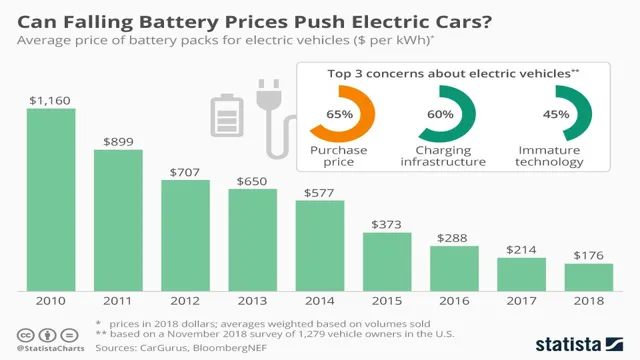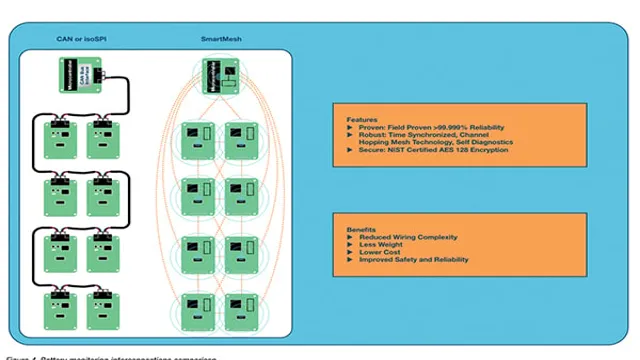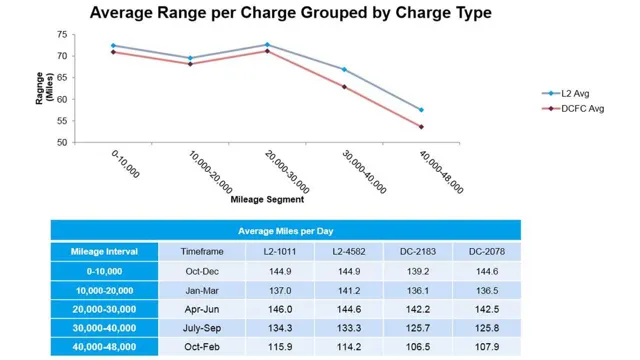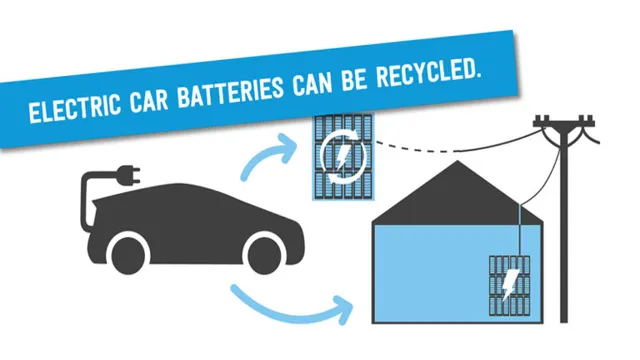Shocking truth about electric car battery depreciation: How it’s affecting your vehicle’s value
It’s no secret that electric cars are gaining in popularity thanks to their eco-friendly efficiency and overall cost-savings. However, a commonly overlooked aspect of owning an electric car is the depreciation of its battery. Every battery has a limited lifespan, and while it may take years for an electric car battery to fully degrade, it’s essential to understand how depreciation can impact the value and performance of your vehicle in the long run.
In this blog, we’ll dive into the causes and effects of electric car battery depreciation, as well as ways to mitigate and manage this inevitable process.
What is battery depreciation?
Electric car battery depreciation is a natural process where the battery gradually loses its capacity to hold a charge over time. The amount of depreciation your battery experiences will depend on the make and model of your vehicle, your driving habits, and the environmental conditions that your car is exposed to. For example, if you drive your vehicle frequently or in overly hot or cold climates, your battery will depreciate more quickly than if you drive it sparingly and in moderate weather conditions.
In general, car manufacturers estimate that electric car batteries will last for around 8-10 years or 100,000 miles before needing replacement. However, it’s important to note that any depreciation in battery performance will happen gradually over time, meaning that you may not notice its effects until later in the battery’s life. It’s crucial to take good care of your electric car battery to minimize depreciation, including keeping it cool and avoiding overcharging or depleting the battery too frequently.
Defining the concept of battery depreciation in electric cars
Battery depreciation is a phenomenon that occurs in all electric cars, where the performance and range of the battery gradually deteriorate over time. Think of it like the battery in your smartphone or laptop, where even after a year or two of use, the battery no longer holds a charge for as long as it used to. The same principle applies to electric car batteries, as they experience wear and tear from repeated charging cycles and exposure to high temperatures.
While battery technology has improved significantly over the years, the reality is that all electric car batteries will eventually degrade to the point where they need to be replaced or reconditioned. This is why many electric car manufacturers offer warranties and maintenance programs specifically for their batteries, as they recognize that this is a critical component of the vehicle’s overall performance. As a consumer, it’s important to factor in the potential cost of battery replacement when considering the long-term ownership costs of an electric car, as this can significantly impact the vehicle’s resale value.
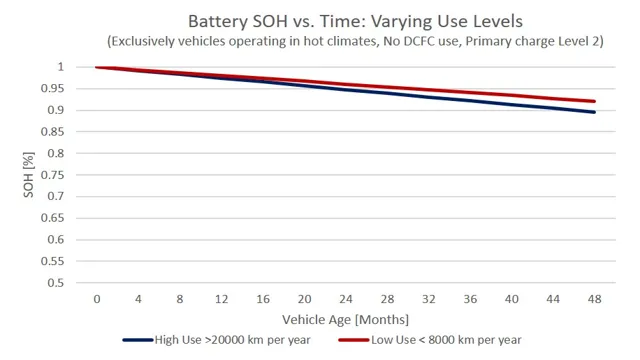
Factors that affect battery depreciation
Electric car battery depreciation is an inevitable reality that can occur over time, but certain factors can affect how quickly it depreciates. One factor is how often the car is charged and discharged. Frequent charging and discharging can increase the rate of battery degradation.
Another factor is temperature. High temperatures can accelerate the rate of battery degradation, while cooler temperatures can slow it down. The type of battery in the electric car can also impact deterioration.
Some battery chemistries are more susceptible to depreciation than others. Finally, the age of the battery can affect its performance and overall health. As an electric car battery approaches the end of its lifespan, its ability to hold a charge decreases.
By understanding the factors that can impact electric car battery depreciation, owners can take steps to slow down the natural deterioration process and ensure their electric car battery lasts as long as possible.
Age of the battery
The age of a battery is a crucial factor that affects its depreciation. Over time, batteries experience wear and tear that inevitably leads to a decrease in their capacity and performance. The battery chemistry is primarily responsible for how well it maintains its charge and its overall longevity.
Additionally, factors such as the number of charging cycles, usage patterns and environmental conditions including temperature can also affect the battery’s lifespan. In simple words, the more you use a battery, the quicker it will wear out. Therefore, you have to be mindful of how often you use your device and maintain proper charging practices to ensure the battery ages gracefully and retains its optimal performance.
Overall, it’s important to monitor your battery’s condition regularly and replace it as needed to keep your devices running smoothly.
Number of charging cycles
When it comes to battery depreciation, one significant factor is the number of charging cycles a battery has gone through. Every time a battery is discharged and then recharged, it counts as one cycle. The more cycles a battery goes through, the more its capacity to hold a charge diminishes, and the shorter its lifespan becomes.
For example, a smartphone battery’s typical lifespan is between 500 and 800 charging cycles. Still, this varies depending on usage and charging habits. If you frequently charge your phone and let it run down to zero before recharging, it will reduce your battery’s lifespan.
Additionally, charging your phone to 100% can lead to a higher battery temperature, which can further increase battery degradation. To extend your battery’s lifespan, it’s best to avoid completely draining it and charge it intermittently throughout the day to keep the battery level between 20% and 80%.
Temperature fluctuations
When it comes to the lifespan of a battery, temperature fluctuations can play a significant role in its depreciation. The optimal temperature range for most batteries is around 20 to 25 degrees Celsius. However, exposing a battery to high temperatures, such as in a hot car or direct sunlight, can cause it to degrade faster than it normally would.
On the other hand, extreme cold can also affect a battery’s performance by reducing its ability to hold a charge and making it harder to start. While it may be difficult to control the temperature of your battery at all times, taking measures to keep it within an ideal range can help extend its lifespan. This could include parking in shaded areas, avoiding leaving your devices in a hot car for extended periods, or using insulated covers to protect your battery from extreme cold.
By being mindful of these factors, you can help ensure that your battery stays healthy for as long as possible.
Driving habits and usage patterns
Driving habits, battery depreciation Your driving habits and usage patterns can have a significant impact on the life of your car battery. While batteries naturally degrade over time, certain actions can accelerate this process. One common factor is frequent short trips, as this does not give the battery enough time to fully charge.
High temperatures, such as those experienced during long periods of idling or extended road trips, can also damage the battery. In addition, using electronic devices while the engine is off, such as playing music or charging a phone, can drain the battery quickly. If you frequently engage in any of these practices, it’s important to keep an eye on your battery’s health and plan accordingly for preventative maintenance or potential replacement.
By adjusting your habits and usage patterns, you can extend the life of your battery and save money in the long run.
How to slow down battery depreciation
Electric car battery depreciation is a concern for every electric vehicle owner. However, there are ways to slow down the process and extend the life of your battery. First and foremost, it’s important to avoid using fast chargers on a regular basis.
While convenient, they put a lot of stress on the battery and can lead to faster deterioration. Instead, opt for slow and steady charging with a level 2 charger. Another way to slow down battery depreciation is to keep the battery within its optimal temperature range.
Extremely hot or cold temperatures can cause damage and shorten the battery’s lifespan. Additionally, avoiding deep discharging and keeping the battery at a moderate state of charge can also help extend its life. By following these simple tips, electric car owners can slow down battery depreciation and enjoy their vehicle for years to come.
Proper maintenance and care
As a smartphone user, it’s important to understand how to take care of your battery properly to ensure it lasts as long as possible. One of the most effective ways to slow down battery depreciation is by being mindful of how frequently you charge your phone. While it may be tempting to charge your phone whenever you have the chance, it’s actually better to let your battery drain down to 20-30% before plugging it in.
Overcharging your battery can actually do more harm than good in the long run. It’s also important to avoid exposing your phone to extreme temperatures, which can cause the battery to degrade more quickly. By taking good care of your battery, you can enjoy using your phone for longer without having to worry about it losing its charge too quickly.
Avoiding extreme temperatures
The temperature at which you store your device can have a significant impact on your battery’s overall lifespan. To slow down battery depreciation, it’s essential to avoid exposing your device to extreme temperatures for prolonged periods. High temperatures can trigger a chemical reaction within the battery, leading to irreversible damage that can shorten its lifespan.
On the other hand, storing your device in extremely cold temperatures can also affect its performance, as low temperatures can slow down the chemical reactions within the battery. To ensure your battery lasts longer, it’s best to store your device in a cool, dry place, and avoid exposing it to direct sunlight or extreme temperatures. By adopting these simple habits, you can help prolong your battery’s life and ensure your device lasts longer.
Optimizing charging habits
When it comes to prolonging battery life, optimizing your charging habits is key. One of the best ways to slow down battery depreciation is to avoid letting your battery get completely depleted before charging it. This can cause irreversible damage to the battery and significantly reduce its lifespan.
Instead, try to keep your battery level between 20% and 80% as much as possible. Another tip is to avoid leaving your device plugged in overnight or for long periods of time after it has reached maximum charge. This can also cause unnecessary stress to the battery and shorten its lifespan.
Additionally, using a high-quality charging cable and avoiding exposing your device to extreme temperatures can also help to extend the life of your battery. By taking simple steps to optimize your charging habits, you can enjoy longer battery life and save money on costly battery replacements.
When should you replace your battery?
Electric car battery depreciation is a factor to consider when deciding when to replace your battery. Just like any other type of battery, an electric car battery will eventually lose its ability to hold a charge over time. The rate at which an electric car battery loses its charge-holding capacity depends on many factors, such as the age of the battery, how it has been maintained, and the driving conditions.
Generally, most electric car batteries will last for around 8-10 years, but this can vary based on these factors. When the battery begins to lose its capacity to hold a charge, you will start to notice a decrease in range and performance. This is due to the battery’s inability to deliver the same amount of power as it did when it was new.
When this happens, it’s time to consider replacing your battery.
Signs of a deteriorating battery
If you’ve been experiencing problems with your car’s battery, it might be time to replace it. A deteriorating battery can manifest in a few ways, such as a slow engine crank, frequent jump-starts, and dimming headlights. If you notice any of these signs, it’s a good idea to get your battery checked by a professional.
You don’t want to be stranded on the side of the road with a dead battery. Ideally, you should replace your battery before it completely dies to avoid any inconveniences. The lifespan of a battery can vary depending on factors such as driving habits and weather conditions.
However, a typical car battery can last between three to five years. If you’re unsure about the state of your battery, get it inspected by a mechanic who can assess its health and advise you on whether it needs to be replaced. Remember, a healthy battery is essential for the proper functioning of your car’s electrical systems.
Don’t take chances when it comes to your vehicle’s battery. Keep it in good condition and replace it when necessary to avoid any potential issues down the road.
Calculating the cost-effectiveness of replacing a battery
Replacing a battery is an important decision to make, especially when you consider the cost-effectiveness. It’s important to note that not all batteries need to be replaced at the same time. When should you decide to replace your battery? The answer to this question lies in the battery’s age, usage, and overall performance.
Generally, a battery should be replaced every three to five years, but heavy usage or extreme temperatures can cause a battery to deteriorate faster. It’s also important to consider the cost of replacement versus the cost of a new device altogether. The cost of replacing a battery varies depending on the type of device, but you should factor in the battery’s lifespan and the potential for additional repairs that may be required.
Ultimately, the decision to replace a battery should be based on its performance and how much longer you anticipate using the device. If your device is working well with a newer battery, it may be worth the investment. A new battery can last several years, which could save you the expense of purchasing a new device in the long run.
Factors to consider before replacing a battery
As technology advances, batteries are becoming more efficient and long-lasting. However, even the best batteries have a limited lifespan. So when should you replace your battery? One factor to consider is the age of the battery.
Most batteries last between three to five years, depending on usage. If your battery is approaching this age range, it is often a good idea to replace it. Another factor is the performance of the battery.
If you notice that your battery is not holding a charge like it used to or if your device is shutting off unexpectedly, it may be time for a replacement. Additionally, if your device is heating up excessively, there may be an issue with the battery. Lastly, consider the cost of a replacement battery versus the cost of purchasing a new device.
If the cost of a new battery is too high compared to the cost of a new device, it may be more practical to upgrade to a new device.
Conclusion
Like a fruit that goes bad over time, electric car batteries also experience natural depreciation. However, unlike a fruit, electric car batteries don’t need to be thrown away and replaced entirely. With proper care and maintenance, the battery life of an electric car can be extended, much like a piece of fruit can be saved by putting it in the fridge.
So, don’t let battery depreciation scare you away from electric cars – just like with fruit, a little bit of TLC can go a long way.”
FAQs
What is electric car battery depreciation?
Electric car battery depreciation refers to the decrease in the battery’s capacity to hold a charge over time due to usage and other factors.
How long does it take for electric car batteries to depreciate?
Electric car batteries typically depreciate over the course of several years, with the rate of depreciation varying depending on the specific battery and its usage.
Can you prevent electric car battery depreciation?
While it’s impossible to completely prevent electric car battery depreciation, careful usage of the battery and regular maintenance can help slow the rate of depreciation.
What happens when an electric car battery reaches the end of its life?
When an electric car battery reaches the end of its life, it may need to be replaced or refurbished in order to continue functioning properly. This can be costly, so it’s important to budget for battery replacement when purchasing an electric car.
